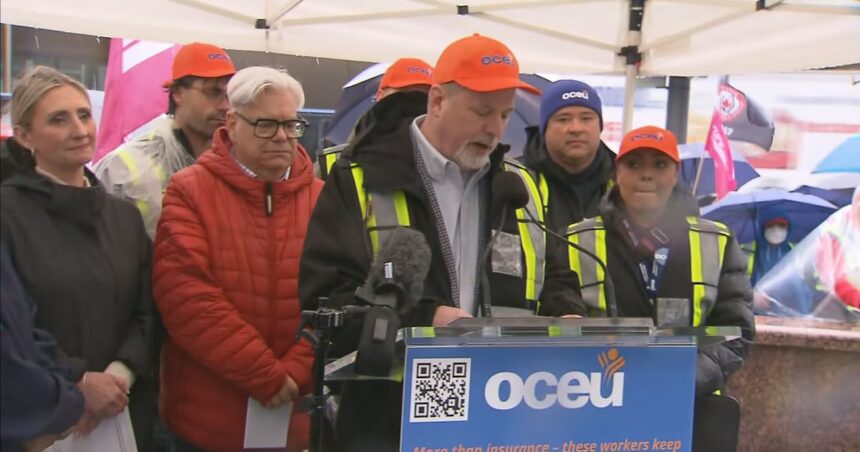I’ve been covering labor disputes in Toronto for nearly a decade, but the scene outside the Workplace Safety and Insurance Board headquarters yesterday morning was something else entirely. Nearly 4,000 WSIB workers hit the picket lines across Ontario, with Toronto’s Front Street location seeing some of the most vocal demonstrations I’ve witnessed in years.
The workers, represented by the Ontario Public Service Employees Union (OPSEU), rejected what union president JP Hornick described as a “disgusting” wage offer. Standing amid protesters chanting “Fair deal now!” near the WSIB’s glass tower, I spoke with several employees who expressed frustration over what they characterize as years of stagnant wages against rising inflation.
“We’re not asking for the moon here,” said Melissa Chen, a claims adjudicator who’s worked at WSIB for eight years. “We’re asking for a wage that keeps pace with the cost of living in Toronto, which as we all know, isn’t exactly affordable anymore.”
According to OPSEU, the WSIB’s latest offer included annual increases of just 1.5 percent, significantly below the current inflation rate. When I asked about this discrepancy, WSIB spokesperson Christine Arnott provided a statement saying the board is “disappointed negotiations have reached this point” and remains “committed to reaching a fair agreement.”
The striking workers process injury claims, determine benefits, and provide return-to-work support for Ontarians injured on the job. This walkout marks the first strike in the agency’s history, creating immediate concerns about service disruptions.
Toronto business owner Marco Fernandez, who runs a construction company in Etobicoke, expressed worry about the impact. “We had two workplace injury claims in process before the strike. Now everything’s in limbo, and my employees are anxious about whether their benefits will be delayed.”
WSIB has implemented a contingency plan to handle critical services, but multiple sources within the agency told me that significant backlogs are inevitable. The board processes approximately 200,000 claims annually, with Toronto representing nearly a quarter of that volume.
The timing couldn’t be more challenging for the provincial agency. WSIB recently reported a $3.4 billion operational surplus last year, a fact not lost on striking workers. “They’re sitting on billions while offering us crumbs,” said Omar Patel, an 11-year WSIB veteran I spoke with on the picket line.
Health and safety consultant Emily Rodriguez, who regularly works with WSIB on behalf of Toronto businesses, offered perspective on the situation. “These workers handle traumatic cases daily – serious injuries, fatalities, psychological claims. It’s intensely demanding work that requires expertise and compassion. The question becomes whether compensation reflects those demands.”
The strike highlights broader labor tensions across Ontario’s public sector. Last year saw education workers narrowly avoid a strike after the provincial government initially attempted to impose a contract through legislation.
For Toronto’s business community, particularly small enterprises that rely on timely processing of claims, the disruption creates significant uncertainty. The Toronto Regional Board of Trade estimates that prolonged WSIB service interruptions could impact thousands of local businesses, particularly in manufacturing, construction, and healthcare sectors.
As negotiations continue behind closed doors, the streets around WSIB offices remain filled with workers who insist they won’t return without substantial improvements to the offer. Union representatives have indicated willingness to negotiate around the clock, but as of this writing, no new talks have been scheduled.
For injured workers awaiting decisions or benefits, WSIB has established an emergency contact system, though multiple callers I interviewed reported extended wait times and limited assistance.
The labor dispute underscores growing tensions between worker expectations and employer offers in a period of economic uncertainty. With Toronto’s cost of living among Canada’s highest, the gap between wage increases and inflation creates real financial pressures for workers.
As this situation develops, I’ll continue providing updates on negotiations and the impact on Toronto’s workers and businesses. For now, the picket lines show no signs of thinning, and the path to resolution remains unclear.







